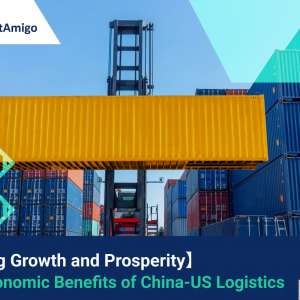Author Name: Tiffany Lee – Marketing Analyst at FreightAmigo
The concept of a green supply chain seeks to integrate environmental thinking into traditional supply chain management. It involves considering the ecological impact of products from the sourcing of raw materials to production, distribution, consumption, and final disposal. Green supply chain is not only about being environmentally responsible but also about finding new opportunities for innovation and cost savings. Green supply chain practices are not just for the sake of the environment; they also enhance a company’s reputation and can lead to increased customer loyalty. Implementing a green supply chain requires a change in mindset, but the long-term benefits are worth the effort.
Want To Compare The Best Express, Air Freight, Sea Freight, Rail Freight & Trucking Rates So As To Have Better Control On Cost?
The Importance of Green Supply Chain in Modern Logistics
In today’s globalized world, the green supply chain plays a crucial role in modern logistics. With increasing consumer awareness and regulatory pressures, businesses are expected to be transparent about their environmental footprint. A green supply chain can help companies meet these expectations and stand out in the competitive market.
Green supply chain management (GSCM) is not just about complying with environmental regulations; it is also about driving operational efficiency. By reducing waste and optimizing resource use, companies can cut costs and improve their bottom line. Moreover, a green supply chain can open up new business opportunities. Companies that demonstrate environmental stewardship can win over environmentally conscious consumers and gain access to new markets.
The green supply chain is also important for risk management. Companies that fail to consider their environmental impact may face backlash from consumers, regulatory fines, and damage to their reputation. By implementing a green supply chain, companies can mitigate these risks and ensure their long-term sustainability.
Understanding Green Supply Chain Management (GSCM)
Green Supply Chain Management (GSCM) is a holistic approach to supply chain management that considers environmental impact alongside traditional performance indicators such as cost, quality, and delivery time. GSCM involves incorporating environmental considerations into every stage of the supply chain, from product design and material sourcing to production, distribution, and end-of-life management.
GSCM is based on the principle of sustainable development, which seeks to meet the needs of the present without compromising the ability of future generations to meet their own needs. By implementing GSCM, companies can reduce their environmental footprint and contribute to sustainable development.
GSCM is not a one-size-fits-all solution; it requires a tailored approach based on a company’s specific circumstances. The key to successful GSCM is to integrate environmental considerations into the company’s strategic planning and operational processes. This requires commitment from top management and involvement of all employees.
The Impact of Green Supply Chain on Sustainability
The green supply chain has a significant impact on sustainability. By reducing waste, conserving resources, and minimizing emissions, the green supply chain contributes to environmental preservation. But the impact of the green supply chain goes beyond the environment.
A green supply chain can also contribute to economic sustainability. By driving operational efficiency and cost savings, the green supply chain can enhance a company’s financial performance. Furthermore, a green supply chain can create new business opportunities. Companies that adopt green supply chain practices can differentiate themselves in the market and attract environmentally conscious consumers.
In terms of social sustainability, the green supply chain can improve working conditions and community relations. By promoting safe and healthy working environments, the green supply chain contributes to employee well-being. By engaging with local communities and supporting local sourcing, the green supply chain can also contribute to social development.
The Role of Sustainability in Supply Chain Management
Sustainability plays a central role in supply chain management. It involves balancing economic performance with environmental stewardship and social responsibility. In the context of supply chain management, this means considering the environmental and social impact of supply chain activities.
Sustainability in supply chain management involves various practices, including reducing waste, conserving energy, minimizing emissions, promoting fair labor practices, and supporting local communities. By adopting these practices, companies can reduce their environmental footprint, enhance their reputation, and create value for all stakeholders.
Sustainability is not just a moral obligation; it can also be a strategic advantage. By integrating sustainability into their supply chain management, companies can drive operational efficiency, foster innovation, and enhance their competitiveness.
Advantages of Implementing a Green Supply Chain
1.Cost Savings
By reducing waste and optimizing resource use, companies can lower their operational costs. Moreover, by improving energy efficiency and reducing emissions, companies can save on energy costs and avoid potential regulatory fines.
2.Enhance a Company’s Reputation
With increasing consumer awareness and societal expectations, companies that demonstrate environmental stewardship can differentiate themselves in the market. A green supply chain can also lead to increased customer loyalty and brand value.
3.Drive Innovation
By challenging traditional practices and seeking sustainable alternatives, companies can discover new ways of doing business. This can lead to new products, services, and business models that can give a company a competitive edge.
Challenges Faced in Green Supply Chain Management
Despite its benefits, implementing a green supply chain can be challenging. Companies may face obstacles such as high initial costs, lack of technical knowledge, and resistance to change. Moreover, implementing a green supply chain requires coordination with suppliers and other stakeholders, which can be complex and time-consuming.
Other challenges include measuring the environmental impact of supply chain activities and demonstrating the business case for green supply chain practices. Despite these challenges, the benefits of green supply chain management make it a worthwhile endeavor for companies.
How to Overcome Challenges in Green Supply Chain Management
FreightAmigo plays a crucial role in overcoming challenges in Green Supply Chain Management. FreightAmigo helps businesses optimize their supply chain operations while minimizing their environmental impact. By leveraging advanced technologies and data analytics, FreightAmigo enables companies to make informed decisions regarding transportation routes, mode selection, and shipment consolidation, resulting in reduced carbon emissions and improved fuel efficiency.
Moreover, FreightAmigo promotes sustainability by facilitating collaboration among stakeholders. The platform connects shippers, carriers, and suppliers, fostering transparency and enabling them to work together towards common environmental goals. Through this collaboration, companies can implement eco-friendly packaging solutions, waste reduction strategies, and greener logistics practices.
FreightAmigo: AmiGo Green assists businesses in achieving carbon emission reduction goals
Through the carbon emission calculator and effective green freight route planning, AmiGo Green logistics technology solution assists companies in selecting a more environmentally friendly logistics mode. We help in achieving energy savings and emission reduction goals, as well as lowering operating costs and increasing operational efficiency! AmiGo Green has reduced more than 120,000 tons of carbon dioxide emissions in just one month, which is equivalent to the amount absorbed annually by almost 727 trees! Let’s practice carbon emission reduction goals with FreightAmigo, make trade greener!
Conclusion
The green supply chain is more than just a trend; it is a strategic imperative in today’s business world. It brings numerous benefits, including cost savings, increased customer loyalty, and enhanced reputation. Despite the challenges, companies can successfully implement a green supply chain by adopting a strategic approach, fostering a culture of sustainability, and leveraging technology.
There Are Different Options For Cargo Transportation. If You Want To Choose The Most Convenient And Suitable Solution, It Is Best To Have The Full Support Of Logistics Experts! If You Are Planning To Ship Goods Overseas, Please Go To The FreightAmigo Page For Inquiries.
===
Read More:
【Logistics News】Singapore to Sign Declaration on Green Shipping Corridors
FreightAmigo Won Startup Grand Award In TechChallenge — Digitising Trade Finance
Sailing Schedule: Streamlining Logistics Operations for Efficient Shipments
===
If you have any inquiries on logistics/supply chain, feel free to contact FreightAmigo now:
Chat with us online OR
Phone : +852 28121686
WhatsApp: +852 27467829









































